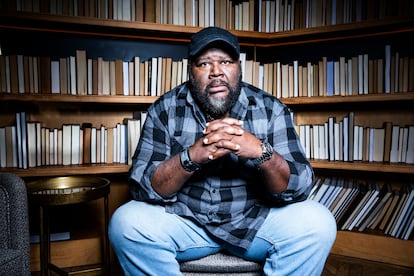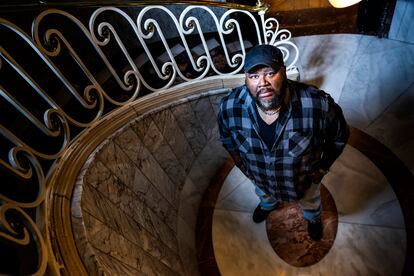S.A. Cosby’s crime fiction: action, violence and social commentary
The author has earned acclaim for four novels that infuse the genre with a unique take on American issues


At the age of seven, Shawn Andre Cosby had his first taste of storytelling in Newport News, the Virginia beach town where he grew up and where his father worked as a fisherman. Young Shawn’s mother’s bedtime stories provided an escape from the life of a poor, Black family in a southern state. However, he didn’t like the endings, so Shawn’s mother encouraged him to rewrite them. This sparked a love for storytelling that has stayed with him throughout his life. Now, at the age of 50, the author of Razorblade Tears has joined an elite club of American crime novelists. Praised by critics and admired by fellow authors such as Michael Connelly and Stephen King, Cosby has also garnered commercial success with readers. He recently attended Getafe Negro, Madrid’s crime novel festival, where we had the chance to interview him.
Known for his remarkable style, the author skillfully weaves together a commentary on U.S. racial dynamics with compelling elements of the genre: fast-paced action, intriguing plots and well-crafted narratives. His fourth novel — All the Sinners Bleed — represents the culmination of a journey that began in 2019. “George Floyd had just been murdered by the police when I started writing this novel. That devastated me, you know? I wanted to talk about what was happening — about racism in America, about policing and corruption. The process of writing really helped me deal with these issues,” he says resolutely in a voice that resonates with warmth and charisma. Cosby is a large man with broad shoulders and massive, yet graceful hands.
In All the Sinners Bleed, Cosby moves away for the first time from the outlaws that populated his previous books. The story follows Titus Crown, the first Black sheriff of a small county in Virginia. He’s a complex character who must confront the dark soul of the seemingly peaceful countryside and track down a hidden serial killer. “Titus is a very moral person who does the right thing even when nobody is looking… He’s not my absolute favorite character, but he’s definitely the best. I usually write about people who aren’t good — it’s easier because they don’t play by the rules… But I wanted to do something different and challenge myself.” Racism, a recurring theme in his novels, holds a deeper significance in this story. Despite Crown’s position, education and work with the FBI, he still experiences the impact of racism. “Not everyone in America is racist, but racism plays a big part in everything that happens in America.”

In his stories, Cosby highlights social issues through well-developed characters — Black men navigating complex situations. They’re always trying to do what’s right, to get out of that criminal underworld and break free from a past that’s holding them back. “When I write, I always start with characters first. The characters are the most important thing because there aren’t that many different plots in fiction.” The two main characters in Razorblade Tears (2021) are aging ex-cons living in rural Virginia. When their sons, a gay, biracial couple with a baby daughter, are brutally murdered, the two radically different men team up on a quest for revenge. Cosby says his favorite character is Blacktop Wasteland’s (2020) Beauregard “Bug” Montage, a Black auto mechanic and former thief in a small southern town in rural Virginia. Published in the midst of the pandemic, Cosby said, “It’s a book I really wanted to write, whether it sold or not. I just needed to get it out there. It tells the story of people like the ones I grew up with. And it’s a book that totally changed my life.”
“Writers tell lies to find the truth” reads the tattoo on Cosby’s right forearm. Truth and guilt are two prominent themes that permeate Cosby’s novels, always set in the American South with its rural landscapes populated by country folk facing deep-seated injustices. “You have to be very strong to live in the South… it’s a unique sort of strength because of all the history. But that being said, I love the South and living in a small town…. there’s a great sense of community.”
“You have to be very strong to live in the South... it’s a unique sort of strength because of all the history.”
“Crime fiction is a gospel of the poor and the forgotten. More than any other genre, it can talk to social issues, pain, loneliness, and desperation in a way we can all understand,” said Cosby about his preferred genre as a reader and now as a writer. For Cosby, the holy trinity of crime fiction are Walter Mosley, Dennis Lehane and Elmore Leonard. “They made me realize what crime fiction could do… After reading one of their books, you think about it after you finish — it stays with you. They write in a way that’s so magical, even if they’re writing about very dark and sometimes brutal things. They’re my three biggest influences, and I’m so very lucky that I got to meet them and become friends.”
Cosby started writing at a young age, but didn’t get serious about it until he was 18 when a teacher named Mr. Bone noticed he had a talent for writing. “He made me believe in literature and all its possibilities… This is such a blessing — I love telling stories. You know, we didn’t have much when I was little, so we didn’t travel… My novels have now taken me all over the United States and the world — how could I not like it?”
After his first visit to Spain, Cosby will return to Gloucester, Virginia, the small town of 3,000 where he lives with his wife. It’s a place that keeps him grounded after making The New York Times bestseller list and receiving some of the genre’s most prestigious awards. “I have people in my life that are really important to help me stay balanced. That’s the best way to say it, even if it’s not at all easy.” He writes at home for about three hours in the morning and two in the evening. “I think if you try to write too long, you try to force something — it doesn’t work. You’ve got to let the words come out naturally.” The only two constants in his routine are his lucky hat (which his wife wants to throw away because it’s torn and dirty) and his playlist for writing — American hip-hop songs, Bruce Springsteen and sometimes instrumental music. He says he’s working on a new novel about a family that owns a crematorium and gets into trouble with gangsters — sounds like pure S.A. Cosby.
Sign up for our weekly newsletter to get more English-language news coverage from EL PAÍS USA Edition
Tu suscripción se está usando en otro dispositivo
¿Quieres añadir otro usuario a tu suscripción?
Si continúas leyendo en este dispositivo, no se podrá leer en el otro.
FlechaTu suscripción se está usando en otro dispositivo y solo puedes acceder a EL PAÍS desde un dispositivo a la vez.
Si quieres compartir tu cuenta, cambia tu suscripción a la modalidad Premium, así podrás añadir otro usuario. Cada uno accederá con su propia cuenta de email, lo que os permitirá personalizar vuestra experiencia en EL PAÍS.
¿Tienes una suscripción de empresa? Accede aquí para contratar más cuentas.
En el caso de no saber quién está usando tu cuenta, te recomendamos cambiar tu contraseña aquí.
Si decides continuar compartiendo tu cuenta, este mensaje se mostrará en tu dispositivo y en el de la otra persona que está usando tu cuenta de forma indefinida, afectando a tu experiencia de lectura. Puedes consultar aquí los términos y condiciones de la suscripción digital.








































